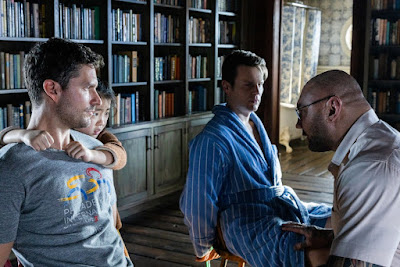It's a nifty premise, granted - an inversion of Richard Kelly's The Box, where a couple were handed a device that killed complete strangers and - with it - a deathly responsibility few of us would ever want to have to consider outside the cinema. Shyamalan first sets his characters to having what apologists for right-wing quackery insist on calling "a conversation", trying to hear both sides out equally. The intruders aren't swivel-eyed zealots, exactly: they include a nurse, a gas company worker, and - in Big Len's case - a teacher. Were it not for the bizarre, medieval-looking armaments they've been encouraged to take up, and their willingness to sacrifice their own as a sign of their sincerity, they could be regarded as responsible citizens. Slowly, Shyamalan scatters the action with crumbs of backstory, plugging some of the holes in the picture: I enjoyed Eric's derisive "Messageboard?" upon learning where the intruders met. At the same time, you feel the filmmaker using whatever resources a studio is now willing to trust him with to re-test his yarnspinning abilities: he's seeing how long he can string this standoff out before he has to admit one side or another has it right, or - an outside bet you can't dismiss with this filmmaker - that both sides are so entrenched inside their echo chambers that they're very much mistaken. We're meant to be here to bear witness to a gradual fraying of the American social fabric, yet there's a niggling mismatch between the scope of the events being described and the scale of the production, because Shyamalan is still on probation. (Those apocalyptic events we see are framed as news footage on the cabin's flatscreen - and, in reality, some of that footage would be impossible to retrieve or unlikely to make it onto the airwaves.) It's a tense watch, but much of that tension isn't the tension Shyamalan wants to cultivate or remind us of - it's a tension that comes from us feeling this story could fall to pieces, The Happening-style, with one false move in the screenplay.
Perhaps the real story with Knock at the Cabin, then, is that it hangs together for as long as it does. There are flashes of the Shyamalan A-game, not least in his work with these actors: he coaxes a genuine distress out of Cui, and is quite clever about finding ways not to deploy Bautista's bulk. (The presence of Broadway regular Groff, and of the West End's own Nikki Amuka-Bird among Leonard's crew, suggests Shyamalan understood this project represents a form of fringe theatre - one location, words as weaponised descriptors, a concerted push to wring maximum resonance from a controlled scenario and a confined space.) Some good news: he's regained his ability to work the frame, to shift the viewer's eyes around from shot to shot. His extreme, angular close-ups allow us to scan each face here for signs of weakness, doubt or dissemblance, and there's some nice, macabre detail along the way. (Hitch would have chortled at the character who plants down in a rocking chair to slit their own throat, so the lifeless body bobs back and forth.) Yet again the camera has had to pick up the slack from a wobbly penhand, top-heavy as that is with its bearer's saviour complex (and fascination with same). In the final third, Shyamalan writes everybody into not just a tight spot but a dead end; his payoff begs for a credulity at least 50% of the audience isn't going to have. This viewer, certainly, wasn't buying it, and I'm not sure I can really even sell Knock at the Cabin as a fun time at the movies, exploiting as it does real-world neuroses and insecurities, a general feeling that everything's falling apart all at once. You leave the cinema with a sense that M. Night Shyamalan is working his way back towards the light, albeit in an America that finds itself in a most unhappy if not entirely hopeless place. I mean: swings and roundabouts, right?
Knock at the Cabin is now playing in cinemas nationwide.

No comments:
Post a Comment